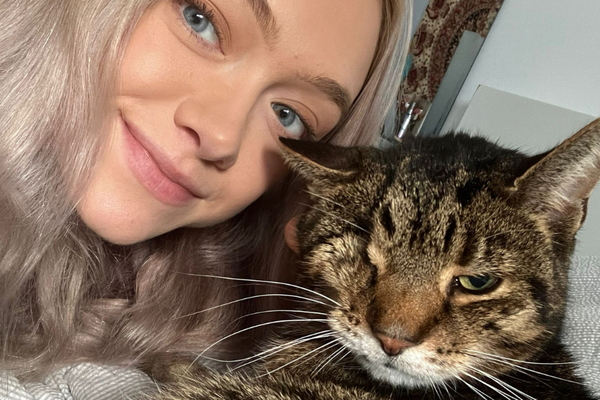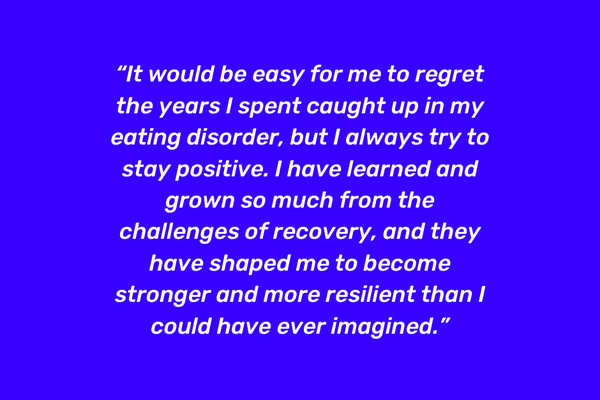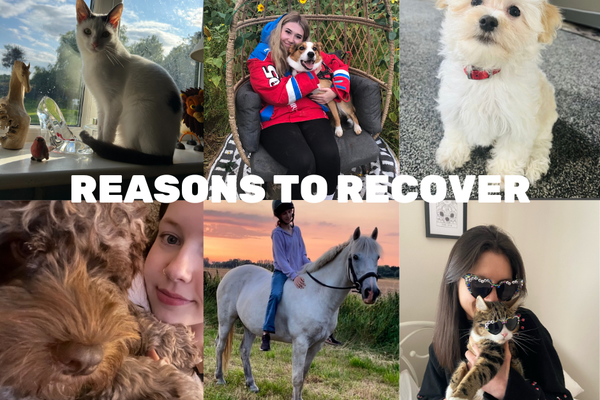What happens when you’re “not sick enough”?
My name is Katie, I am currently a 3rd year medical student studying in the UK, and for the past almost two years now, I have been coping with disordered eating. It all began after finishing my first year at uni and having subsequently put on the “Freshers Fifteen”. I had gained weight gradually just through eating and drinking more than I usually would, and unfortunately I started Uni in the midst of the first wave of COVID-19, so sports clubs and activities were non-existent. By the end of the year I was still a normal weight for my height but I didn’t recognise myself anymore. I had always been relatively slim growing up but now I hated how I felt in my skin and how my clothes felt on my body.
I was hesitant to go to the doctor because, as a medical student, I knew what I was doing was not healthy
That summer I made a resolution to lose the weight and get “healthy”. Unfortunately I did this in the least healthy way possible. I started restricting. I became obsessed with counting calories and began trying to compensate for eating with constant exercise. Of course all of this was done in secret and resulted in me feeling huge amounts of guilt for nourishing my body.
What started as a summer project, carried on into my first term of second year and friends started to notice my change in eating habits. A few months down the line I opened up to my best friend about how I had been struggling and she encouraged me to book a GP appointment which I reluctantly did. I was hesitant to go to the doctor because, as a medical student, I knew what I was doing was not healthy and I knew what I had to do to start changing these habits. I didn’t think that the GP would tell me anything that I didn’t already know and didn’t think it would help.
My struggles at this point in time were much more mental than physical.
Unfortunately I was right. It took a lot of courage for me to open up to a stranger about something that is so personal and private, and which at the time I was really ashamed about. Unfortunately, throughout the whole consultation there wasn’t a moment where I felt like I was being taken seriously. I had lost a lot of weight since the start of the summer, but wouldn’t be classified as underweight. For all intents and purposes I looked “well”.
But my struggles at this point in time were much more mental than physical. And due to that I was overlooked. In her eyes I was “not sick enough” to warrant support but in my mind I felt like I was spiralling out of control. I left that appointment and cried. I felt invalidated and like I now had even less support than when I walked into the consultation. Luckily, over time, I was able to pull myself out of that mindset thanks to the love and support of my friends and family. I still struggle with intrusive thoughts around food but am gradually learning to fall in love with eating again.
How many people who have been admitted to hospital with eating disorders could have been helped if they had effective, early intervention?
However, it got me thinking; if I had continued down that path I was on, would I only be given help if it got to a point where I needed hospitalisation? How many people are out there that were like me, starting to snowball and wanting it to stop, but getting overlooked because they weren’t seen as sick enough yet to need help. I don’t blame that GP for not giving me the support that I needed because obviously there is a lack of resources available to help people like me.
This is a systemic law within the healthcare system and as someone who is soon to be working in the NHS myself, I strongly believe that this needs to be rectified. How many people who have been admitted to hospital with eating disorders could have been helped if they had effective, early intervention? Letting people slip through this gap in the system only adds to the rising number of hospitalisations and deaths caused by eating disorders. I might not have been sick enough to need medical intervention but I was sick enough to ask for help. So where do you go from there?
-Contributed by Katie
If you've been affected by any of the issues raised in this story, or are concerned for yourself or a loved one, you can find support and guidance on the help pages of our website.
Need some help preparing for your doctors appointment? Check out our guide to speaking to your GP
Help us change more lives
Donate today to help us provide more vital support to people like Katie
Reasons to Recover: How our furry friends helped us in recovery part two
20 February 2025Here is part two of how your pets supported you through your recovery.
Finding me again in eating disorder recovery - Georgia’s story
30 January 2025Rebuilding your identity in recovery can be daunting - here I share some tips that helped me find the old and new me in recovery
Reasons to recover: how our furry friends helped us in recovery
22 October 2024It's not just people who can support you through recovery - our furry friends can be there to help us too


